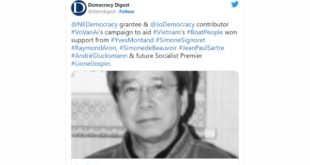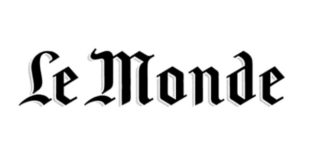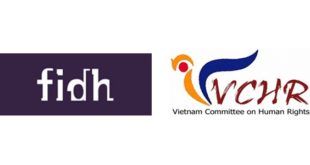Vietnam’s Religion Law ‘created to repress, control’
Published: April 28, 2016 by Vishal Arora – Last year, Reg Reimer, a professor at the Evangelical Fellowship of Canada, gave a thorough overview of the proposed law, saying “it is almost inevitable the new law will disappoint proponent of universal human rights”.
“The passing of this far-reaching new law on belief and religion … will much more likely move the political system toward more micromanagement and control of religion, rather than toward more religious freedom as internationally understood,” he said.
There have been five revisions to the draft of the new law, the latest being tabled in parliament in November 2015. No date has been set for when the law will come into effect; initial estimates suggested it may do so last year.
The new law will supersede the current decrees and ordinances on religion and cement their provisions. The current decrees were only a temporary measure; now they will be enshrined in law.
Vietnam is No. 20 on Open Doors’ 2016 World Watch List, which ranks the 50 countries in which life as a Christian is most difficult.
Transcript of video
“Communism in Vietnam is like a religion, a secular religion. Vietnam is a one-party state, and Article 4 of the constitution gives all the power to the Communist party.
“The Communist party is very paranoid. In fact, historically, it always considered people who are not with [it] are against [it]. Before, it was for ideological reasons. Now, I think it’s more a question just of power, money, etc., etc. All the organizations [that] are not Communist [are seen as] a threat.
“There is no religious freedom because the Communist regime tries to control everything in the religious life. The regime [has created] lots of other state-sponsored churches. There is unofficial and official, and unofficial churches are repressed. When you are recognized, it means you are under the control of the party and you can do nothing.
“We have several texts [decrees] on religion. The texts always say at the beginning: everybody has the right [to practise] religion, and you can believe, etc., etc. But in the other provisions, it always says you can’t abuse your right of religion to infringe upon the interests of the state. It means that the Vietnamese authority gives people human rights, but at the same time it is taking back human rights. So, in fact, there is no human rights. You have a very visible repression against different religions, like the Christians.
“They’re going to adopt a new law, a law on religion. This law is not a law on religion; it’s just a law on how to manage the control of religion.
“The regime just says you have the freedom of religion [only] if you respect all the conditions of the party. It means, if you want to organize an event, you have to demand permission. If you want to create a church, you have to pass an exam, of several years – I think it’s about 10 years, or 5 or 10 years. And if there is no problem, then you can have the [status] of recognized religion.
“The main philosophy of the text [the new proposed law on religion] is repression and control.
“In fact, in Vietnam, religions are the sole representatives of the civil society. It means that the Communist party just tolerates all the religions. They know that religion [is] essential for people, and, moreover, religion is quite interesting for tourism. In fact, in Vietnam, the authorities firstly authorize all the very beautiful religious ceremonies – it’s very beautiful for tourists, so [they] bring money.”
Vietnam’s relationship with West gives hope for religious freedom
Published: April 28, 2016 by Vishal Arora
Transcript of video
Vo Tran Nhat, Executive Secretary, Vietnam Committee on Human Rights:
“The alliance between Vietnam and the United States is based on common interests. Vietnam is very afraid of China because of the problem in the South China Sea. And the United States wants to use Vietnam as a tool against China. And Vietnam wants to have a strong ally against China. It could be a chance for [the promotion of] human rights because that’s right that with the opening of the economy in Vietnam, a lot of people can know what happens outside the country, which was not the case before.
“But the problem is that if the United States is not firm on the human rights question, and just wants to make business and a military alliance, and forgets human rights because they know if they talk about human rights … so Vietnam would say, well, we don’t want to work with you, we’re going to work with China, it would be a big problem for [the cause of] human rights in Vietnam.
“For the Communist party, there’s no question they want to respect human rights. And for the Americans, they have to ask the question, if they want to have just [short-term] interests now, then we’d just talk about military and economy. But if they want to talk about the future of Vietnam, and the future of their relations in Asia Pacific, they have to be firm on human rights.
“We’re working very strongly to push the American administration to work hard on human rights. We do the same with the European Union. And the European Union has recently signed a partnership agreement with Vietnam. It seems they don’t want to talk about human rights … [They] say it’s very important, but in reality they don’t [want to talk about it].”
Read the article on WorldWatch Monitor website
 Quê Me Quê Me: Action for democracy in Vietnam & Vietnam Committee on Human Rights
Quê Me Quê Me: Action for democracy in Vietnam & Vietnam Committee on Human Rights



